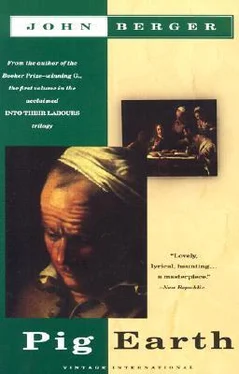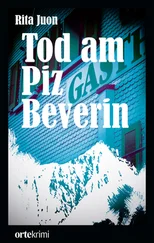“We had only daughters,” she said, by way of explanation.
The two of them listened to Rousa’s difficult breathing.
“The Patron is as cunning as a fox, isn’t he? He used to leave money on the table. Did you know that? He used to leave it there at night to see if I was honest. One day I said to him, ‘You needn’t worry! I eat my own money but I’m not going to eat yours or the Patronne’s!’ ”
The thought of this riposte of ten years ago made him burst into song:
“Bon Soir! Bon Soir.
You gave me the moon!”
When he could remember no more words, he continued on the mouth-organ. He serenaded her. He addressed her across Rousa’s head, which rested on the ground. Every so often, out of tact, he looked away from her and across to the peak opposite. He played to the mountain and the woman. To the dead and the unborn.
Then, laughing, he broke into words again:
“Bon Soir! Bon Soir.
You give me the moon …”
On the last note his voice creaked like a pine tree in a storm. On the slope there was not a breath of wind. Then he pulled his beret over his ear and laid his head down to sleep.
Five minutes later Martine said: “If we can get her on to her feet in the stable tomorrow she has a chance. She wants to get up, I can feel it, Joseph.”
He was already asleep with his knees drawn up. His open hand, palm uppermost, had fallen across the cow’s udder. Beside it was an empty winebottle which he must have brought with him under the blankets.
Next morning eight neighbours came to pull Rousa, with ropes attached to each of her legs, across the grass and into the stable. They talked of using a pulley and rope to hoist her to her legs, but the stable ceiling was too low. After they had gone, Martine continued to puzzle on how she could save the cow.
She pushed planks under her in the hope of levering her up. She asked Joseph to stand on the far end of a plank. He jumped up and down with all his weight until he had to stop to pull up his trousers. But nothing moved the cow. The complacency of her look was turning into indifference. Her white patches were muddied with shit and with the soil she had been pulled across.
Between carrying out Martine’s instructions, Joseph kept shaking his head.
Now she had the idea that they should nail blocks of wood to the floor by her hind feet, so that if she tried to get up by herself, she would have something to push against. Joseph cut the blocks of wood and nailed them to the floor.
The day the butcher’s lorry came, Rousa was dragged through the door and up the ramp into the lorry. She made no sound. All she did was to roll her eyes, rolling them upwards, until only the blue-grey of the underneath of her eyeballs was visible.
In the lorry she tried for the last time to shift the dead weight of the body, muscles, tissue, organs, passages and vessels which had turned her mad for a bull, and had made her a cow with a yield of twenty-five litres of milk. But she couldn’t. The cold from the mountainside was creeping up her back.
Martine stepped into the lorry and stuffed an armful of straw between Rousa’s flank and the sharp metal housing round the back wheel. The road down was full of pot-holes, and she did not want the animal, who could not move, to suffer by her skin being chafed against the metal.
“She’s a cow,” one of the men said, when the back doors of the lorry were shut.
“A poor beast,” said another.
Joseph stared after the lorry and remained standing in the middle of the rutted road long after it was out of sight.
“Hey, Joseph,” a neighbour shouted.
He turned round, waved and made three dance steps.
“Come and have a drink!”
He disappeared into the stable where he looked at the horse who was older than him.
Like a trout
our mountain basks
in the setting sun
as the light drains
the trout dies
its mouth open
the night
with its wings of spruce
flies the mountain
to the dead
HIS FACE WAS THIN and his body was stocky. Sixty-three years old, his hair was still black. When he rode Gui-Gui, his work horse, there was a distinct resemblance between them: both were compact, like a loosely clenched fist. He sat high up by her collar, and he sat there firmly, as she, with her thick short legs, breasted the steep slopes.
He was the only man in the village who planted new apple trees. After the cider was pressed, he took an armful of marc and carefully buried it in the corner of his garden. The following year there were several shoots. He separated them out and mulched them, and in three years’ time they were large and sturdy enough to plant out in the orchard. Later he grafted on to them.
The other men reasoned that the old trees — some of them were perhaps two hundred years old — would last their lifetime and that afterwards the orchards would be abandoned.
When I’ve gone, nobody is going to work my farm, one of them said.
We’ll be in the orchard of the Dead! another shouted loudly, the very loudness affirming that they were not in that orchard yet.
Marcel, however, was a philosopher. In the evening he tried to explain to himself what had happened during the day, and thereafter to act according to his explanations.
This is how he explained planting the new apple trees.
My sons won’t work on the farm. They want to have free weekends and holidays and fixed hours. They like to have money in their pockets so as to be able to spend it. They have gone to earn money, and are mad about it. Michel has gone to work in a factory. Edouard has gone into commerce. (He used the term commerce because he did not wish to be harsh towards his youngest son.) I believe they are mistaken. Selling things all day, or working forty-five hours a week in a factory is no life for a man — jobs like that lead to ignorance. It is unlikely that they will ever work this farm. The farm will end with Nicole and me. Why work with such effort and care for something which is doomed? And to that I reply: Working is a way of preserving the knowledge my sons are losing. I dig the holes, wait for the tender moon and plant out these saplings to give an example to my sons if they are interested, and, if not, to show my father and his father that the knowledge they handed down has not yet been abandoned. Without that knowledge, I am nothing.
Nobody ever expected to see Marcel in prison. Often when a man’s destiny suddenly changes as the result of his own actions, it is difficult to know how far back the story really began. I will only go back as far as the previous spring.
He was carting the winter’s manure to the fields, distributing it in small piles about two metres apart. Later he would fork these piles evenly over the grass and earth. He carted the manure in a tipcart drawn by Gui-Gui. The similarity of build between horse and man had its usefulness. When the cart was full with a load of four hundred kilos, the young mare started hauling it up the slope as fast as she could, so as to gain momentum for the climb. Marcel, holding the bridle by her head, strode with her, and her forelegs and his legs kept perfect time. Fast time. Frequently they were forced to stop and regain their breath, before starting up again. Whilst they worked together, he talked to her, using a language of very abbreviated sounds to save his breath. These sounds had once derived from curt instructions or oaths; now they had left their meaning behind, and were just an accompaniment to the movement of their climbing legs. Sometimes he made these sounds in his cell in the prison at B.…
From the poultry house Nicole saw an unfamiliar tractor coming down the road. She waited to see where it would turn off. In the middle of the road, where no wheels went, the spring grass was already beginning to grow. At the side, on the banks, were clumps of violets.
Читать дальше












